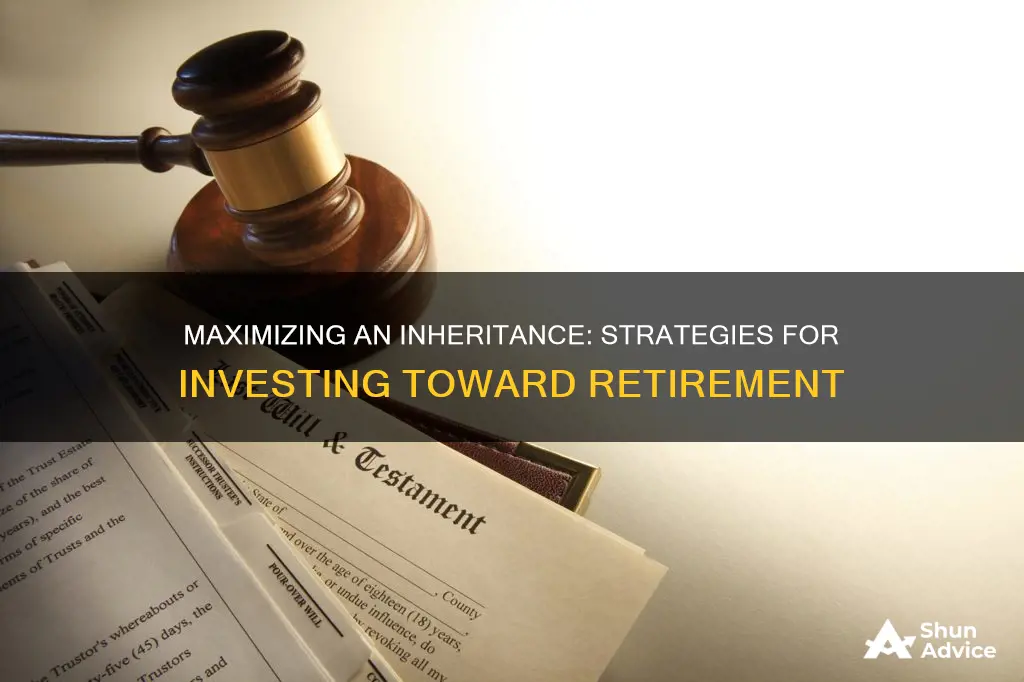
Investing an inheritance for retirement can be a complex process, and it's important to take a slow and measured approach. While you may be tempted to splurge on dream vacations or shopping sprees, it's crucial to save and invest wisely for the future. Here are some steps to consider:
- Take time to grieve and process your loss. There is no rush to make immediate financial decisions. Park your inheritance in a safe, federally insured bank or credit union account in the short term.
- Seek professional advice from a financial advisor, accountant, or estate planning lawyer to help you navigate the process and make a comprehensive plan that aligns with your goals.
- Evaluate your current financial situation and priorities. If you have high-interest debt, such as credit cards or personal loans, consider paying those off first.
- Build an emergency fund to cover unforeseen expenses. This will provide a safety net and ensure you don't have to dip into your retirement savings prematurely.
- Maximise your contributions to tax-advantaged retirement accounts, such as an Individual Retirement Account (IRA) or company retirement plans like 401(k). These accounts offer tax benefits and help you save for the long term.
- Consider investing in stocks, bonds, mutual funds, exchange-traded funds (ETFs), or real estate. Diversifying your investments can provide a balance of risk and return.
- Understand the tax implications of your inheritance. Consult with a tax professional to ensure you're aware of any taxes owed on inherited assets or withdrawals from retirement accounts.
- Don't be afraid to treat yourself to a modest splurge, but maintain moderation and avoid rash decisions that could deplete your inheritance.
| Characteristics | Values |
|---|---|
| What to do with the money | Invest it for retirement, pay off debt, build an emergency fund, save for children's college fund, pay for a home, etc. |
| Where to invest the money | Individual retirement accounts (IRAs), company retirement plans (401(k) or 403(b)), health savings accounts (HSAs), brokerage accounts, etc. |
| What to do with inherited investments | Consult a financial advisor, understand the tax implications, and decide whether to sell or hold |
| What to do with inherited real estate | Sell the property, rent it out, or move into it |
| How much to invest | Contribute the maximum amount allowed, or as much as you can afford |
What You'll Learn

Seek financial advice
Seeking financial advice is a prudent step when investing an inheritance for retirement. Here are some reasons why:
Navigating Complexities:
Financial advisors are experts in their field and can provide valuable guidance in navigating the complexities of investing an inheritance. They have experience dealing with similar situations and can offer unbiased advice. This is especially important if you've never received an inheritance before, as the process can be emotionally challenging and unfair.
Understanding Tax Implications:
Understanding the tax implications of your inheritance is crucial. A financial advisor can help you navigate the tax rules associated with different types of inherited assets, such as securities, retirement accounts, or real estate. They can advise you on strategies to minimise taxes, such as utilising tax-advantaged accounts or taking advantage of stepped-up tax basis on inherited investments.
Creating a Comprehensive Investment Strategy:
Financial advisors will work with you to understand your financial goals, risk tolerance, age, and obligations. They can then create a comprehensive investment strategy tailored to your needs. This may involve restructuring your investments to align with your retirement goals and automating your portfolio for convenience.
Emotional Support and Guidance:
Inheriting a substantial sum of money can be overwhelming, especially when dealing with the loss of a loved one. Financial advisors provide an objective perspective and help you make rational decisions. They ensure that your financial choices are well-informed and aligned with your long-term interests, rather than being driven by emotions or impulse.
Peace of Mind:
By seeking financial advice, you can have peace of mind knowing that your inheritance is being managed effectively. Advisors will help you avoid common pitfalls and ensure your money is working hard for your future. They provide ongoing support and guidance, allowing you to feel more confident in your financial decisions.
Remember to choose a financial advisor who is a fiduciary, has relevant experience, and offers a transparent fee structure. Their expertise can make a significant difference in your retirement planning and help you make the most of your inheritance.
Wealthy Secrets: Investment Trends
You may want to see also

Understand tax implications
Understanding the tax implications of your inheritance is crucial to making informed investment decisions. Here are some key points to consider:
Taxation of Inherited Assets:
The taxation of inherited assets depends on the type of asset and your relationship to the deceased. Here are some common scenarios:
- Inherited Retirement Accounts: When you inherit a retirement account like an IRA or 401(k), you typically must include the funds in your taxable income when you make withdrawals. If you inherit from a spouse, you can treat the account as your own. For non-spouse inheritances, you usually have 10 years to take the money.
- Inherited Stocks: If you inherit stocks or taxable investment accounts, you may be subject to federal capital gains tax when you sell the stocks. You can apply for a "step-up" in the cost basis to the market value at the time of the original owner's death, reducing your tax liability.
- Real Estate: When you inherit real estate, the value is also "stepped up" to its value on the date of the owner's death. If you sell the property, you'll pay taxes on the difference between the stepped-up value and the sale price.
- Life Insurance Proceeds: Life insurance proceeds are generally not taxable as income. However, if you receive the funds in installments, the interest may be taxable.
- Cash Inheritance: Cash inheritances are typically not subject to federal inheritance tax. However, some states have their own inheritance tax laws, so check your state's regulations.
Tax-Advantaged Investment Options:
When investing for retirement, consider using tax-advantaged accounts such as a traditional IRA, Roth IRA, 401(k), or 403(b). These accounts offer valuable tax breaks on contributions or withdrawals. For example:
- Traditional IRA: Contributions may be tax-deductible, and taxes on any growth are deferred until withdrawal. Withdrawals in retirement are taxed as ordinary income.
- Roth IRA: Contributions are taxed upfront, but withdrawals in retirement are tax-free if certain conditions are met.
- Traditional 401(k): Similar to a traditional IRA, contributions are tax-deductible, and taxes on growth are deferred. Withdrawals are taxed as ordinary income.
- Roth 401(k): Contributions are made with after-tax dollars, so withdrawals in retirement are tax-free.
Consult a Professional:
The tax implications of investing an inheritance can be complex and depend on your specific circumstances. Consult a qualified financial advisor or tax professional to help you navigate these complexities and make investment decisions that align with your retirement goals while minimizing your tax burden.
Reliance Industries: Invest Now?
You may want to see also

Pay off debt
If you've inherited a large sum of money, it's a good idea to pay off any high-interest debt, such as credit card debt. This is especially true if you don't have an emergency fund, as it's important to prioritise covering those bare necessities.
In England and Wales, it is unusual to inherit debt, but there are exceptions. If the deceased held debt in their sole name, it cannot usually be inherited unless the debt was guaranteed by a third party or the deceased person gifted money shortly before their death. In the latter case, creditors may pursue a claim. When there are joint debts, such as a mortgage, the surviving account holder becomes liable for the full amount.
If you're unsure about what to do, it's a good idea to consult a financial advisor. They can help you understand the tax implications of your inheritance and create a comprehensive investment strategy that aligns with your financial goals.
John Cabot's First Expedition: Investors' Motives
You may want to see also

Save for retirement
Saving for retirement can be a daunting task, but with a few smart strategies, you can boost your retirement savings and feel more confident about your future. Here are some detailed tips to help you save for retirement:
Take Advantage of Retirement Accounts:
- Utilize tax-advantaged retirement accounts such as an Individual Retirement Account (IRA), Roth IRA, 401(k), or 403(b). These accounts offer tax benefits that will help your savings grow over time.
- If your company offers an employer-sponsored retirement plan with matching contributions, prioritize contributing to that account to take full advantage of the match.
- If you don't have access to an employer-sponsored plan or don't receive matching contributions, consider contributing to a traditional or Roth IRA. The annual contribution limit for IRAs in 2024 is $7,000 ($8,000 if you're 50 or older).
- If you're self-employed or a freelancer, explore self-employed retirement plans such as a Solo 401(k), SEP IRA, or SIMPLE IRA. These plans offer higher contribution limits and tax advantages.
Understand the Difference Between Roth and Traditional Accounts:
- The main difference between Roth and traditional accounts is the timing of tax benefits. With a traditional IRA, your contributions may be tax-deductible, and you pay taxes on withdrawals in retirement. With a Roth IRA, contributions are made with after-tax dollars, and qualified withdrawals in retirement are tax-free.
- Consider your expected tax rate in retirement when choosing between a Roth and traditional account. If you anticipate your tax rate being higher in retirement, a Roth account is often a better choice.
Set Clear Savings Goals:
- Aim to save at least 10% to 15% of your pretax income each year for retirement. This is a general guideline recommended by experts.
- Use savings benchmarks based on your age and salary to track your progress. For example, by age 35, aim to save one to one-and-a-half times your current salary for retirement.
- Online calculators and financial advisors can help you determine how much you need to save for retirement based on your income, current savings, and retirement goals.
Automate Your Savings:
- Sign up for automatic contributions to your retirement accounts. This helps you save consistently without having to remember to make contributions manually.
- If your company offers a retirement plan with automatic increase features, take advantage of it to gradually increase your savings over time.
Consult a Financial Advisor:
If you're unsure how to invest your savings or need help creating a comprehensive plan, consider consulting a financial advisor. They can guide you through the process, provide personalized advice, and ensure your investments align with your retirement goals.
Stock Market: Why Don't More People Invest?
You may want to see also

Invest in stocks, bonds and funds
When investing an inheritance, it is wise to take advantage of tax-advantaged accounts whenever possible. These include retirement accounts such as an individual retirement account (IRA), Roth IRA, 401(k), and 403(b). Depending on the type of account, either withdrawals or contributions may come with valuable tax breaks.
Traditional IRA
Contributions may be tax-deductible, and taxes on any growth are deferred until withdrawal. Withdrawals are taxed as ordinary income.
Roth IRA
Contributions are taxed as ordinary income, and any gains are tax-free if they’re withdrawn in retirement.
Traditional 401(k)
Contributions are tax-deductible, and taxes on any growth are deferred until withdrawal. Withdrawals are taxed as ordinary income.
Roth 401(k)
Employee contributions are made with after-tax dollars, so qualified withdrawals in retirement will be tax-free. The account can grow tax-free.
The biggest difference between a Roth and a traditional account is when the money is taxed. For traditional accounts, withdrawals are taxed as income. For Roth accounts, contributions are taxed as income. You can leave money in these accounts, potentially for decades, continuing to grow the accounts without being subject to a penny in taxes.
Whether it is better to put money in a Roth or a traditional account is an ongoing debate and depends on your circumstances. In general, if your income in retirement will be higher than it is currently, a Roth account might be better.
Stocks
Stocks are a great way to invest for retirement, especially if you are younger than 50. You have plenty of years until you retire and can ride out any current market turbulence. If you are older, you may want to allocate more of your portfolio to bonds.
Bonds
Bonds are an important piece of an investment portfolio's asset allocation since the steady return from bonds helps offset the volatility of equity prices. Bonds are less likely to lose money than stocks, so buying some bonds and some stocks can reduce your portfolio's losses during stock market declines. Bonds pay interest regularly, so they can help generate a steady, predictable stream of income from your savings. Next to cash, U.S. Treasurys are the safest, most liquid investments. Short-term bonds can be a good place to park an emergency fund or money you'll need relatively soon.
Paycheck Investing: A Guide to Regularly Buying Amazon Stock
You may want to see also
Frequently asked questions
Take your time and make a plan. It's important to grieve and not rush into any decisions. You might want to park the money in a safe, federally insured bank or credit union account in the short term.
You could contribute to an individual retirement account (IRA), max out your company retirement plan, add to a health savings account (HSA), or open a brokerage account.
You generally won't owe tax on money you inherit, but other assets like securities, retirement accounts, or real estate may have tax implications. It's important to understand the tax basis of any inherited investments and the potential taxes when you sell them.
Yes, paying off high-interest debt such as credit cards or personal loans is generally a good idea. This can provide financial relief and free up cash flow for other purposes.
It's recommended to seek professional financial advice, especially if you're uncomfortable making financial decisions. A financial advisor can help you navigate the complexities and create a comprehensive investment strategy that aligns with your goals.







